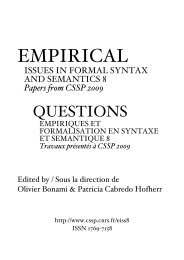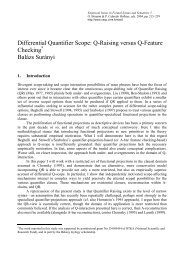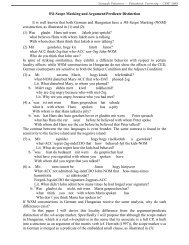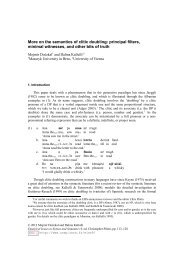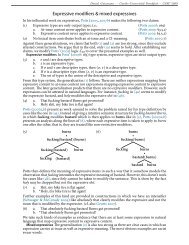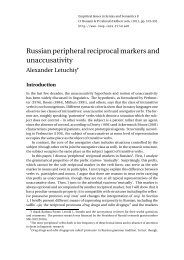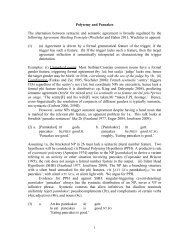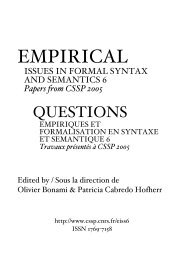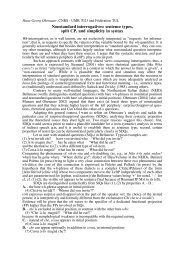Empirical Issues in Syntax and Semantics 9 (EISS 9 ... - CSSP - CNRS
Empirical Issues in Syntax and Semantics 9 (EISS 9 ... - CSSP - CNRS
Empirical Issues in Syntax and Semantics 9 (EISS 9 ... - CSSP - CNRS
Create successful ePaper yourself
Turn your PDF publications into a flip-book with our unique Google optimized e-Paper software.
‘the greatest French soldier’ to mention an <strong>in</strong>dividual, but to say someth<strong>in</strong>g about<br />
an <strong>in</strong>dividual I had already mentioned. It would be natural to say that <strong>in</strong> us<strong>in</strong>g this<br />
sentence I was talk<strong>in</strong>g about Napoleon <strong>and</strong> that what I was say<strong>in</strong>g about him was<br />
that he was the greatest French soldier. But of course I could use the expression,<br />
‘the greatest French soldier’, to mention an <strong>in</strong>dividual; for example, by say<strong>in</strong>g: ‘The<br />
greatest French soldier died <strong>in</strong> exile’.<br />
Graff (2001) articulates what Strawson was gett<strong>in</strong>g at <strong>in</strong> a more precise way, argu<strong>in</strong>g that def<strong>in</strong>ites<br />
can serve as predicates, that is, functions from <strong>in</strong>dividuals to truth values. Strong evidence<br />
that def<strong>in</strong>ites can have this type was given by Doron (1983), who shows that def<strong>in</strong>ites pattern<br />
with other predicate-denot<strong>in</strong>g expressions <strong>in</strong> be<strong>in</strong>g able to function as the second argument of<br />
consider:<br />
(8) John considers this woman competent / a good teacher / the best teacher / his girlfriend /<br />
*Mary / *some good teacher I know / *you.<br />
Furthermore, as Doron (1983) shows, def<strong>in</strong>ites <strong>and</strong> <strong>in</strong>def<strong>in</strong>ites can be used without an overt<br />
copula <strong>in</strong> Hebrew, but the copula is obligatory with proper names, pronouns, <strong>and</strong> eize ‘some’<br />
<strong>in</strong>def<strong>in</strong>ites; this can be understood under the assumption that def<strong>in</strong>ites can denote properties.<br />
W<strong>in</strong>ter (2001) gives an analysis on which predicative def<strong>in</strong>ites are type 〈e,t〉, as suggested<br />
by this data. Accord<strong>in</strong>g to his analysis, def<strong>in</strong>ites are <strong>in</strong>itially predicative, <strong>and</strong> become quantificational<br />
<strong>in</strong> argument position by comb<strong>in</strong><strong>in</strong>g with a choice function. He gives two versions of the<br />
def<strong>in</strong>ite article, one Russellian <strong>and</strong> one Strawsonian. The Strawsonian one is as follows.<br />
(9) W<strong>in</strong>ter’s lexical entry for the (W<strong>in</strong>ter 2001:153–4)<br />
THE = λP : |P| = 1 . P<br />
On the Russellian version, the card<strong>in</strong>ality constra<strong>in</strong>t |P| = 1 is part of the asserted content. Under<br />
both versions, existence <strong>and</strong> uniqueness are simultaneously encoded <strong>in</strong> a s<strong>in</strong>gle statement.<br />
If it is def<strong>in</strong>ed, the mean<strong>in</strong>g of (2b) ‘Scott is not the only author of Waverley’ is as follows.<br />
(10) ¬THE(ONLY(AUTHOR))(S)<br />
Intuitively, (2b) is true if Scott is an author of Waverley, <strong>and</strong> Waverley has at least one additional<br />
author. If that is the case then |AUTHOR| > 1. But neither Scott nor the additional author is an<br />
‘only author’, because for both, there is a dist<strong>in</strong>ct <strong>in</strong>dividual who is an author. So there is no ‘only<br />
author’, i.e. |ONLY(AUTHOR)| = 0. Whenever there is more than one author, ONLY(AUTHOR)<br />
fails to meet the presuppositional requirements of THE. So, under this analysis, the sentence is<br />
predicted to <strong>in</strong>troduce a presupposition failure <strong>in</strong> exactly those scenarios where, <strong>in</strong>tuitively, it is<br />
true.<br />
Which presupposition is fail<strong>in</strong>g, existence or uniqueness? The card<strong>in</strong>ality-one requirement<br />
|P| = 1 expresses uniqueness <strong>and</strong> existence at once; let us break this apart <strong>in</strong>to a uniqueness<br />
component |P| < 2 <strong>and</strong> an existence component |P| > 0. Our problem is not that there are<br />
too many satisfiers of the predicate ‘only author’; the problem is that there are too few; aga<strong>in</strong>,<br />
|ONLY(AUTHOR)| = 0. Thus it is the existence presupposition that is caus<strong>in</strong>g our problem, not<br />
the uniqueness presupposition, as it may have appeared at first.<br />
62



